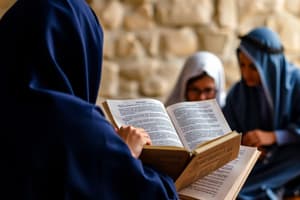Podcast
Questions and Answers
What is the age range for primary education in Israel?
What is the age range for primary education in Israel?
- ages 5-12 (correct)
- ages 6-13
- ages 4-11
- ages 3-10
What percentage of Israel's population is Jewish?
What percentage of Israel's population is Jewish?
- Approximately 90%
- Approximately 74% (correct)
- Around 60%
- Around 80%
What is unique about the Druze religion in Israel?
What is unique about the Druze religion in Israel?
- It is a mix of Islamic, Jewish, and Christian influences (correct)
- It is an offshoot of Islam
- It is an offshoot of Judaism
- It is a non-Abrahamic religion
What is a subject that is optional in Israel's education system?
What is a subject that is optional in Israel's education system?
What is a way the Israeli education system addresses cultural diversity?
What is a way the Israeli education system addresses cultural diversity?
What is a challenge in implementing a culturally diverse curriculum in Israel?
What is a challenge in implementing a culturally diverse curriculum in Israel?
What is a distinctive feature of the education system particularly in tertiary education in Israel?
What is a distinctive feature of the education system particularly in tertiary education in Israel?
What is a challenge in accommodating religious diversity in Israel's education system?
What is a challenge in accommodating religious diversity in Israel's education system?
How does the Israeli education system accommodate the religious population?
How does the Israeli education system accommodate the religious population?
Flashcards are hidden until you start studying
Study Notes
Jewish Education System
- Structure:
- Primary education (ages 5-12): mandatory and free for all citizens
- Middle school (ages 13-15): separate tracks for secular and religious students
- High school (ages 16-18): students can choose between secular, religious, or vocational tracks
- Post-secondary education: universities, colleges, and yeshivas (Jewish religious institutions)
- Curriculum:
- Core subjects: Hebrew language, mathematics, science, history, and English
- Jewish studies: Torah, Talmud, and Jewish history (emphasis on Jewish heritage and identity)
- Optional subjects: Arabic, arts, and physical education
- Religious Education:
- State-religious schools (Mamlachti-Dati): combine secular and religious studies
- Independent religious schools (Chinuch Atzmai): focus on Talmudic studies and Jewish law
- Yeshivas: post-secondary institutions focused on advanced Talmudic studies
Religions in Israel
- Demographics:
- Jewish population: approximately 74% of the population
- Muslim population: around 18% of the population
- Christian population: around 2% of the population
- Druze population: around 1.5% of the population
- Major Religions:
- Judaism: dominant religion in Israel, with various streams (Orthodox, Conservative, Reform, etc.)
- Islam: second-largest religion in Israel, with a significant Muslim population
- Christianity: minority religion in Israel, with various denominations (Catholic, Orthodox, Protestant, etc.)
- Druze: a unique religious community with a mix of Islamic, Jewish, and Christian influences
- Religious Freedom:
- Israel is a democratic state with a commitment to religious freedom and tolerance
- The Ministry of Religious Services is responsible for ensuring the rights of all religious communities
- However, there are ongoing debates and controversies surrounding issues like religious pluralism, conversion, and marriage laws
Jewish Education System
- Primary education in Israel is mandatory and free for all citizens from ages 5-12.
- Middle school education is divided into separate tracks for secular and religious students from ages 13-15.
- High school education offers students a choice between secular, religious, or vocational tracks from ages 16-18.
- Post-secondary education options include universities, colleges, and yeshivas (Jewish religious institutions).
Curriculum
- The core curriculum in Israeli schools includes Hebrew language, mathematics, science, history, and English.
- Jewish studies are a significant component of the curriculum, focusing on Torah, Talmud, and Jewish history to emphasize Jewish heritage and identity.
- Optional subjects offered in Israeli schools include Arabic, arts, and physical education.
Religious Education
- State-religious schools (Mamlachti-Dati) combine secular and religious studies.
- Independent religious schools (Chinuch Atzmai) focus on Talmudic studies and Jewish law.
- Yeshivas are post-secondary institutions that specialize in advanced Talmudic studies.
Religions in Israel
- The Jewish population makes up approximately 74% of Israel's population.
- The Muslim population accounts for around 18% of the population.
- Christians make up around 2% of the population, while Druze account for around 1.5%.
Major Religions
- Judaism is the dominant religion in Israel, with various streams such as Orthodox, Conservative, Reform, and others.
- Islam is the second-largest religion in Israel, with a significant Muslim population.
- Christianity is a minority religion in Israel, with various denominations including Catholic, Orthodox, Protestant, and others.
- The Druze community is a unique religious group with a mix of Islamic, Jewish, and Christian influences.
Religious Freedom
- Israel is a democratic state that ensures religious freedom and tolerance.
- The Ministry of Religious Services is responsible for protecting the rights of all religious communities.
- Despite this, ongoing debates and controversies surround issues like religious pluralism, conversion, and marriage laws.
Israel's Education System
- Israel is a culturally diverse country with Jews, Arabs, Druze, and other minorities making up the population.
Cultural Diversity in Education
- The education system acknowledges and addresses cultural diversity through:
- Teaching Hebrew and Arabic as compulsory languages in schools.
- Incorporating cultural studies, such as Jewish and Arab history, literature, and traditions.
- Encouraging coexistence and mutual respect among students from different cultural backgrounds.
- Challenges in implementing a culturally diverse curriculum include:
- Balancing the needs and interests of different cultural groups.
- Addressing social and economic disparities between Jewish and Arab populations.
Religious Population in Israel
- Around 80% of Israel's citizens identify as Jewish.
- The education system accommodates the religious population through:
- A separate education system for the ultra-Orthodox (Haredi) community, focusing on religious studies.
- Incorporating Jewish studies and religious education in public schools.
- Recognizing Jewish holidays and traditions in the academic calendar.
- Challenges in accommodating religious diversity include:
- Balancing the needs of secular and religious populations.
- Addressing the tension between religious and secular education systems.
Studying That Suits You
Use AI to generate personalized quizzes and flashcards to suit your learning preferences.




